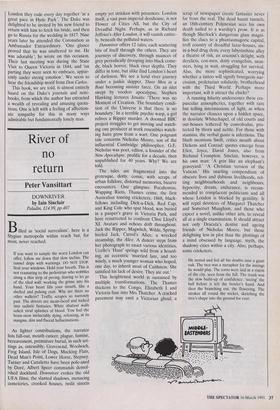• River of no return
Peter Vansittart
DOWNRIVER by lain Sinclair Paladin, £14.99, pp.407 Billed as 'social surrealism', here is a Stygian metropolis within reach but, for most, never reached.
If you want to sample the worst London can offer, follow me down that slow incline. The tunnel drips with warnings. DO NOT STOP. Seal your windows. Hold your breath. This is not reassuring to the pedestrian who wobbles along a thin strip of paving, fearing to let go of the tiled wall: working the grime into his hand. Your heart fills your mouth, like a shelled and pulsing crab. Why are there no other walkers? Traffic scrapes so narrowly past. The drivers are mean-faced and locked into sadistic fantasies. White abattoir walls solicit vivid splashes of blood. You feel the brain-stem ineluctably dying, releasing, at its margins, dim and flaccid hallucinations.
As lighter contributions, the narrator lists fall-out, mouth cancer, plague, famine, bereavement, premature burial, in such set- tings as, ostensibly, Gravesend, Woolwich, Frog Island, Isle of Dogs, Mucking Flats, Dead Man's Point, Lower Horse, Stepney. Turner and Canaletto have been pole-axed by Dore, Albert Speer commands demol- ished dockland. Downriver evokes the old UFA films; the slanted shadows, menacing cemeteries, crooked houses, twilit streets empty yet stricken with presences. London itself, a vast post-imperial dosshouse, is not Flower of Cities All, but the City of Dreadful Night. Perhaps, as in Richard Jeffries's After London, it will vanish entire- ly, beneath the polluted waters.
Downriver offers 12 tales, each scattering bits of itself through the others. They are journeys of discovery, through nuances of grey periodically drooping into black come- dy, black horror, black river depths. They differ in tone, but alike find London's heart of darkness. We see a lurid river journey under a junkie skipper, Three Men in a Boat becoming sinister farce. On an islet swept by voodoo apocalypse, Stephen Hawking lectures Jesuits: 'There was no Moment of Creation. The boundary condi- tion of the Universe is that there is no boundary.' In a terrible psychic warp, a girl relives a Ripper murder. A doomed BBC project struggles to get moving and watch- ing one producer at work resembles watch- ing hairs grow from a wart. One poignant talc concerns Nicholas Moore, son of the influential Cambridge philosopher, G.E. Nicholas was poet, editor, a founder of the New Apocalypse, prolific for a decade, then unpublished for 40 years. Why? We are told.
The tales are fragmented into the grotesque, dotty, comic, with scraps of urban folklore, distorted memories, bizarre encounters. One glimpses Pocahontas, Wapping Riots, Thames crime, the first Australian touring cricketers, 1868, black- fellows including Dick-a-Dick, Red Cap, and King Cole who spat blood, was buried in a pauper's grave in Victoria Park, and here resurrected to confront Clive Lloyd's XI. Avatars and echoes drift throughout. Jack the Ripper, Magwitch, Wilde, Spring- heeled Jack, Carrol's Alice, a wrecked steamship, the Alice. A dancer steps from her photograph to enact various identities, Ucello's 'Hunt' springs wild from a hoard- ing, an eccentric 'married late, and too wisely, a much younger woman who hoped, one day, to inherit most of Caithness. She satisfied his lack of desire. They ate out.'
This heightened world is sustained by multiple transformations. The Thames thickens to the Congo, Elizabeth I and Victoria fuse into Mrs Thatcher, A cracked pavement may emit a Victorian ghoul, a scrap of newspaper create fantasies never far from the real. The dead haunt tunnels, an 18th-century Polynesian sees his own death nailed to a warship's prow. It is as though Sherlock's dangerous glass magni- fies the clues to a phantasmagoric capital, troll country of dreadful lazar-houses, six- in-a-bed drug dens, every labyrinthine alley a theatre of risk, an arsonist's delight, with derelicts, con-men, dotty evangelists, mon- sters, lying in wait, struggling for survival. Also, the more sophisticated, worrying whether a tattoo will signify bourgeois nar- cissism, proletarian solidarity, brotherhood with the Third World. Perhaps more important, will it attract the chicks?
A running hilarity underscores these cre- puscular atmospherics, together with rare but telling intermissions of light, as when the narrator chances upon a hidden space, in desolate Whitechapel, of old courts and out-houses tethered by convolvulus, pro- tected by thorn and nettle. For those with stamina, the verbal gusto is infectious. The blurb mentions Swift, critics mouth about Dickens and Conrad: quotes emerge from Eliot, Joyce, David Jones, also from Richmal Crompton. Sinclair, however, is his own man: 'A grin like an elephant's graveyard.' A Christian version of the Vatican.' His snarling compendium of obscure lives and dubious livelihoods, rot- ting neighbourhoods and neighbours, hypocrisy, dream, endurance, is recom- mended to complacent politicians and all whose London is blocked by gentility. It will repel devotees of Margaret Thatcher and Somerset Maugham, and those who expect a novel, unlike other arts, to reveal all at a single examination. It should attract not only Dracula's dentist and ageing friends of Nicholas Moore, but those delighting less in plot than the plottings of a mind obsessed by language, myth, the shadowy cities within a city. Also, perhaps, some cricketers.
He rested and fed all his doubts into a giant oak. The tree was a metaphor for the innings he would play. The roots were laid in a vision of the city, seen from the hill. The trunk was the slow build-up of confidence: 'seeing' the ball before it left the bowler's hand. And then the branching out, the flowering. The strokes all round the wicket, sketching the tree's shape into the ground for ever.


























































 Previous page
Previous page